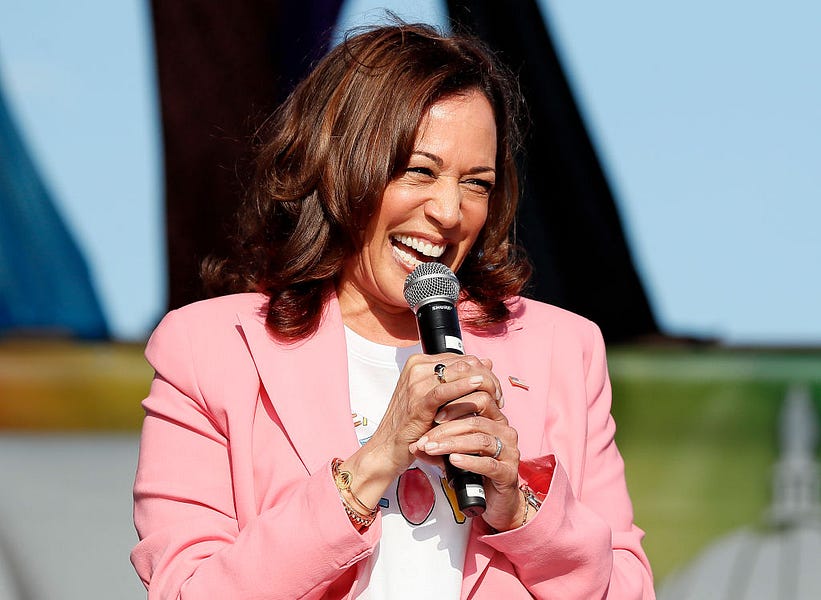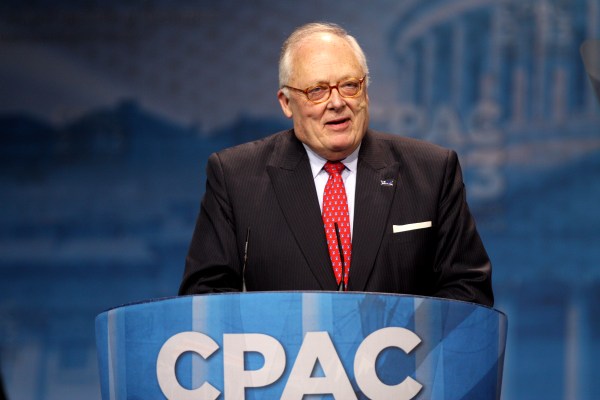Hi,
If you want a good example of how identity politics and media bias are ruining America, look elsewhere. Instead, let us celebrate the triumph of Kamala Harris.
First, let me explain why I say, “look elsewhere.” I think the problem with a lot of right-wing table-thumping about media bias isn’t that it’s wrong, but that it’s credited with way too much of an impact.
I used to write a lot about media bias for a whole bunch of reasons. For starters, back when a tiny number of outlets—90 percent of them concentrated in roughly a square mile of Midtown Manhattan—overwhelmingly dominated what constituted legitimate news and opinion, media bias was more important.
But there were less high-minded reasons. For starters, there was a market for it. A young conservative writer could get an audience by taking a ball-peen hammer to Dan Rather or 60 Minutes because conservatives ate that stuff up.
Indeed, it’s difficult to exaggerate how much the rise of not just right-wing media—Rush Limbaugh, Fox News, etc.—but the infrastructure of the right generally was fueled by the widespread, and largely justified, resentment of the liberal monopoly on journalism and the elite opinion industry.
The last reason why I—and so many others—spent so much time criticizing the media was that it’s easy. You didn’t have to do a lot of reporting or homework to beat up on Dan Rather. He’d do all the heavy lifting for you.
Liberal media bias still exists. But it’s not a monopoly anymore. It doesn’t have the power to shape perceptions the way it once did. If MSNBC or the New York Times could actually drive attitudes and events the way a lot of people insinuate, Biden would be popular, Roe v. Wade wouldn’t have been overturned, and Trump wouldn’t have run for president—never mind been elected. The obsession with liberal media bias is disproportionate to the problem it presents. It feeds off a kind of mass paranoia about the “system” and “elites” “controlling” our lives. The mere fact that so many people make a living out of attacking it demonstrates that it’s not the hegemonic power they claim.
I have one other problem with right-wing media criticism. A lot of it is essentially water carrying for the GOP these days. Republican politicians often run against the media as much as they run against the Democrats. Right-wing criticism of media coverage is often just a way of rushing to the defense of Republicans. Without revisiting my spiel about weak parties seducing various institutions into doing party work, I should still note that the mainstream media—for want of a better term—deserves a lot of blame for this. Because just as a lot of right-wing media criticism is essentially PR work for Republicans, a lot of mainstream reporting is narrative maintenance for Democrats. If supposedly objective reporters are going to frame issues to the benefit of the Democrats—and they do—it’s completely understandable that conservatives are going to push back.
Okay, now that we’re done with the eat-your-spinach portion of this “news”letter, let’s circle back to my second point and talk about Kamala Harris.
The woman is just terrible at her job.
Now, of course, vice presidents don’t really have much of a job as a constitutional matter. The vice president is little more than the Maytag repairman of our republic, sitting around doing nothing until the call comes in. But as a political matter, they’ve acquired a more prominent role, chiefly as the highest-ranking press flack for the president. In order to make them more credible in that role—and the job more attractive to potential running mates—presidents since Jimmy Carter have given them various portfolios to bolster the gravitas of the job. But the chief responsibility is still to deliver whatever message the boss wants out there.
Kamala Harris is a terrible messenger. Comparisons to Selina Meyer, the fictional VP in Showtime’s Veep, are so on the nose that it’s become something of a tiresome cliché. Harris speaks like she spent her formative political years talking only to audiences that already agreed with her—which is largely true. She often sounds like the vice president for inclusion and equity at a third-tier liberal arts college.
But she also has an Al Gore-like tendency to talk as though she’s unpracticed in speaking to people. “This virus,” she once said about COVID, “it has no eyes.” That’s just a weird thing to say to other human beings.
Now, I should note that I was a bit of a tinfoil hatter—or a visionary truth-teller—on the question of whether or not Al Gore was an alien. He’d routinely refer to Earth as “this planet” as if it were a city he was visiting as a galactic tourist. He was born nine months after the “incident” in Roswell, New Mexico. His body language was so stiff and forced that one could be forgiven for thinking he was wearing an ill-fitting and poorly wired human suit. It was like there was a barely perceptible delay between the directions of the alien homunculus running it inside the meat-wrapped command console on top of his shoulders.
Gore once explained that he learned a lot from growing up in two homes, “because just as having two eyes gives you depth perception, having two homes allows you to see some things that stand out in relief when viewed from two different perspectives.” It’s as though he was marveling at the factory-installed features of his new bipedal, binocular conveyance. Naomi Wolf, reportedly his image consultant before she went bonkers, pressed him to wear more “reassuring” “Earth tones” as opposed to his presumably more comfortable Alpha Centauri tones. Then there was the time he called the Washington Post to complain about a grievous error: “I decided I just had to call because you’ve printed a picture of the Earth upside down on the front page of the paper.” Of course, there is no “upside down” in space, but perhaps he was simply nostalgic for the view he had growing up.
Harris has less of an extraterrestrial vibe than Gore. But that’s a textbook example of damning with faint praise, like saying someone is “a better pole dancer than Jonah Goldberg.” Maybe they’ve improved human suit technology, but I think the more apt metaphor is that she talks like a bad A.I. She strings together words and sentences like there’s a glitch in the program, spewing out raw placeholder words rather than the more polished adjectives, verbs, and idiomatic metaphors that we usually take for granted in political rhetoric. “It is time for us to do what we have been doing,” she said in reference to mitigating the spread of Omicron. “And that time is every day.” Or, “If you want to figure out how to get across town to some restaurant you heard is great, you usually do Google,” she said when speaking about how people could find out where to get COVID tests.
She also gets caught in these word loops where she repeats the same thing, or repeats the same idea using a slightly different word order, synonyms, or accent. For instance:
“Our world is more interconnected and interdependent. That is especially true when it comes to the climate crisis, which is why we will work together, and continue to work together, to address these issues, to tackle these challenges, and to work together as we continue to work operating from the new norms, rules, and agreements, that we will convene to work together on to galvanize global action. With that I thank you all. This is a matter of urgent priority for all of us and I know we will work on this together.”
On a trip to Poland in March she declared, “I am here standing here on the northern flank, on the eastern flank, talking about what we have in terms of the eastern flank and our NATO allies, and what is at stake at this very moment—what is at stake this very moment are some of the guiding principles …”
I confess to having a specific bias here. As a writer, I hate word repetition. Or, as Kamala Harris might say, I hate repeating the same words that repeat themselves, like so many words repeated one after the other, in a stream of repetition. In English, unlike, say, Spanish, you’re supposed to vary up the word things. “It was a hot day, so hot that you could feel the hotness all over your body, like you were in a hot oven set to a very hot temperature”—that’s bad writing for lots of reasons, but particularly because it leaves on the shelf all sorts of great synonyms for “hot.” So when I hear Harris say, “We’ve got to take this stuff seriously, as seriously as you are because you have been forced to take this seriously,” it bounces off my ear like a grape off the forehead of a basset hound expecting bacon.
And then there was the time her subroutine got stuck on the concept of the passage of time. “We were all doing a tour of the library here and talking about the significance of the passage of time right. The significance of the passage of time, so when you think about it there is great significance to passage of time,” Harris said. “There is such great significance to the passage of time when you think of a day in the life of our children.”
Perhaps I should “do Google Translate” and see if all this sounds better in Spanish?
Of course, it’s not just the words she uses, but her overall delivery. Her tendency to laugh at weird moments has become a tell that if she did it when playing poker, she’d be broke. If you sat next to someone on a plane who laughs the way she does, you’d probably ask the flight attendant if you could change seats.
Which might explain why so many of her staffers don’t want to work for her. I mean, think about it—Joe Biden is very old [cue inappropriate laughter]. Most Americans—and most Democrats—don’t want him to run again. In normal circumstances, that would make working for Kamala Harris one of the most attractive jobs for ambitious strivers in all of Democratic politics. And yet they keep fleeing like she walked into the office with a suicide vest. “Look what I’ve got!” [cue inappropriate laughter].
It’s like she’s leading an away team for the Enterprise and her whole team is wearing red shirts. Apparently, it’s because she’s a really terrible boss. “With Kamala,” a former staffer told the Washington Post, “you have to put up with a constant amount of soul-destroying criticism and also her own lack of confidence. So you’re constantly sort of propping up a bully and it’s not really clear why.”
Harris should be Biden’s heir apparent. She should be the hope of a party freaking out about a president in near political free-fall. But she actually polls worse than Biden. “No vice-president since Dan Quayle has made less of an impact in their first year of office than Harris,” a veteran of Democratic political campaigns told the New Statesman. “We are now at the point that you can talk about politics for hours without her name coming up.” That is a remarkable accomplishment.
Here’s the thing. I originally planned to write about how the mainstream media’s double standards protect Kamala Harris. But as I was writing this, intellectual honesty intruded and I realized I had the story wrong.
As the guy said when he walked into Scientology headquarters: Let me be clear. I still think media bias is real. I still think identity politics is a problem. But the fact remains that the librul lamestream media has been brutal to Harris. Has Fox been more brutal? Sure. Was the media more unfair to Dan Quayle? I’d say yes. Is the charge of sexism and racism always in the mix? Sure. But whether it’s a testament to how poorly she’s doing or the willingness of the mainstream media to report inconvenient facts, the truth remains that there’s less water-carrying for Harris than I would have predicted. Contrary to every hard-learned expectation I had going into this presidency, her failures are a unifying force in American politics. I assumed that she would be the most untouchable political figure in the entire administration, if not politics generally. Instead, she’s building bridges, fostering bipartisan consensus, and forcing even the mainstream media to jettison its most cherished biases in favor of nonpartisan truth telling.
Going back to her failed bid for the presidency, one of Harris’ favorite lines is, “What we have in common is so much stronger than what divides us.” She’s right. She just doesn’t realize that one of the things we have in common is a low opinion of her job performance.







Please note that we at The Dispatch hold ourselves, our work, and our commenters to a higher standard than other places on the internet. We welcome comments that foster genuine debate or discussion—including comments critical of us or our work—but responses that include ad hominem attacks on fellow Dispatch members or are intended to stoke fear and anger may be moderated.
With your membership, you only have the ability to comment on The Morning Dispatch articles. Consider upgrading to join the conversation everywhere.